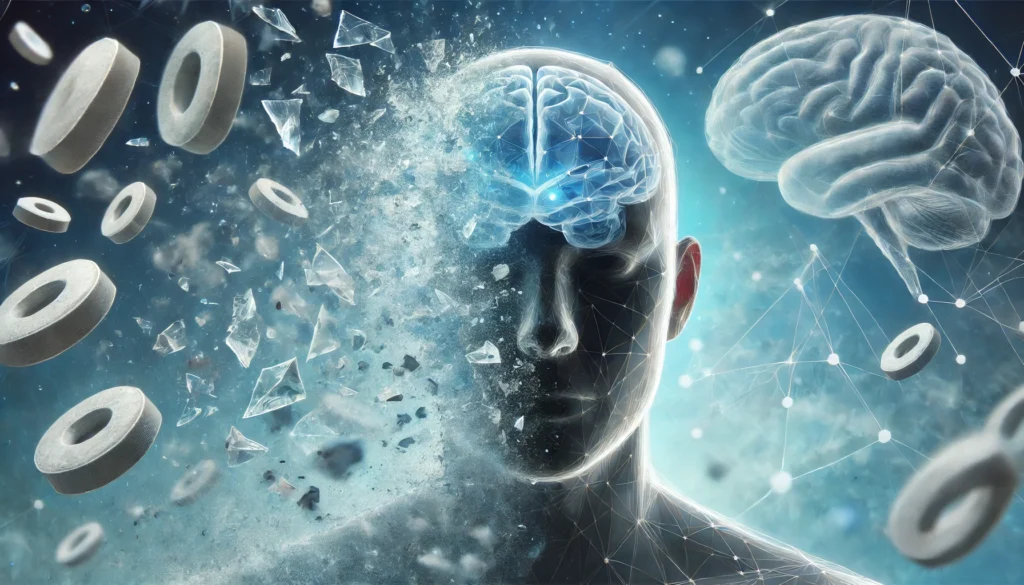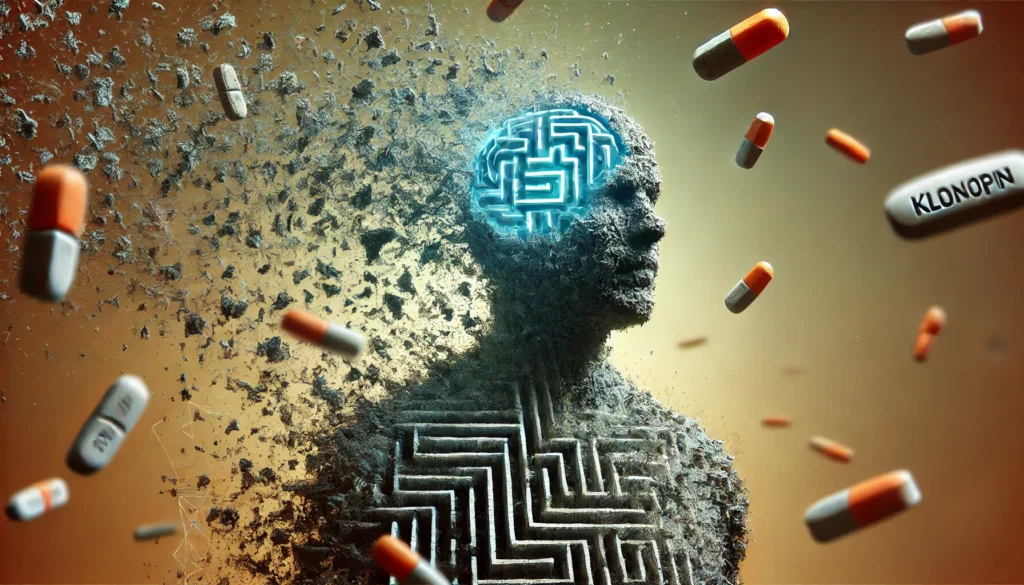Benzodiazepines, or “benzos,” are a class of drugs known for their sedative and anxiolytic effects, acting on the central nervous system. By enhancing the neurotransmitter gamma-aminobutyric acid (GABA) in the brain, these medications produce a calming effect.
You may also like: Understanding the Science Behind Lost Memory
Mechanisms of Action
Benzodiazepines bind to GABA receptors in the brain, increasing the inhibitory effects of GABA. This results in reduced neuronal excitability, which is beneficial for anxiety but can also lead to cognitive side effects. The calming effect, while therapeutic, can interfere with cognitive processes.
Memory Impairment and the Brain
Memory impairment due to benzodiazepines is primarily linked to their action on the hippocampus, a crucial area for memory formation. The hippocampus is instrumental in converting short-term memories into long-term ones, and benzodiazepines can disrupt this process, leading to anterograde amnesia.
Long-Term vs. Short-Term Effects
While short-term memory issues are a common side effect, the long-term implications of benzodiazepine use on memory are less understood. Some studies suggest prolonged use may exacerbate cognitive decline, necessitating careful consideration of treatment duration and dosage.
How Benzodiazepines Affect Memory
Memory impairment associated with benzodiazepines, including Klonopin, often stems from their impact on the hippocampus. These medications interfere with the brain’s ability to consolidate short-term memories into long-term ones, leading to anterograde amnesia.
Anterograde Amnesia: A Closer Look
Anterograde amnesia involves the inability to create new memories while maintaining the ability to recall past events. For individuals taking benzodiazepines like Klonopin, this can result in forgetfulness or difficulty remembering recent conversations or tasks. The severity of amnesia can vary based on dosage and individual susceptibility.
Cognitive Function and Daily Life
Memory impairment can significantly affect daily life, impacting personal relationships, work performance, and overall quality of life. Patients may experience frustration and anxiety due to their inability to recall recent events, which can further exacerbate their condition.
Reversibility of Memory Impairment
The good news is that memory issues related to benzodiazepines are often reversible upon discontinuation of the drug. However, the duration of use and dosage can influence the recovery process, with longer use potentially leading to more persistent cognitive deficits.
Klonopin and Memory Loss: What the Research Says
Research into Klonopin’s impact on memory is ongoing, with studies yielding varied results. Nonetheless, several key findings have emerged that provide insight into its cognitive effects.

Clinical Observations
- Cognitive Decline: Some studies suggest that long-term use of Klonopin may lead to cognitive decline, affecting memory, attention, and executive function. This highlights the importance of monitoring cognitive health during treatment.
- Dosage-Dependent Effects: Higher doses of Klonopin are more likely to result in noticeable memory impairment compared to lower doses. This suggests that careful dosage management is crucial in minimizing cognitive side effects.
- Reversibility: Memory issues related to Klonopin are often reversible upon discontinuation, though recovery can vary depending on the duration and dosage of use. This emphasizes the importance of individualized treatment plans.
Personal Accounts and Anecdotal Evidence
Many individuals who have used Klonopin report experiencing memory lapses, ranging from minor forgetfulness to significant memory gaps. These anecdotal reports underscore the necessity for further scientific exploration to better understand the drug’s cognitive effects.
The Variability in Individual Experiences
Individual experiences with Klonopin can vary widely, with some people experiencing more pronounced memory impairment than others. Factors such as genetic predispositions, overall health, and concurrent medication use may influence these outcomes.
The Science Behind Klonopin’s Impact on Memory
Klonopin’s impact on memory is intricately linked to its interaction with GABA receptors. By enhancing GABA activity, Klonopin not only calms neuronal activity but also impairs the brain’s ability to form and retain new memories.
Neurotransmitter Interaction: The GABA Connection
Klonopin enhances the inhibitory effects of GABA, which reduces neuronal excitability. While this is beneficial for treating anxiety and seizure disorders, it can also disrupt cognitive processes, particularly memory formation and retention.
The Role of GABA in Memory Processing
GABA plays a critical role in modulating memory processes within the brain. By altering GABA activity, Klonopin can affect the synaptic plasticity necessary for learning and memory, leading to potential cognitive deficits.
Long-Term Implications for Cognitive Health
While short-term memory impairment is a known side effect of Klonopin, long-term use may lead to persistent cognitive deficits. It’s crucial for patients and healthcare providers to weigh the benefits of Klonopin against potential risks, especially concerning cognitive health. Ongoing monitoring and assessment are vital for those on long-term treatment plans.
Historical Context and Current Trends
The Rise of Benzodiazepines in the 1960s
Benzodiazepines gained popularity in the 1960s for their effectiveness in managing anxiety and sleep disorders. Their ability to provide rapid symptom relief made them a preferred choice among healthcare providers and patients alike.
Growing Awareness of Side Effects
Over time, awareness of benzodiazepines’ side effects, including memory impairment, has grown. This has led to increased scrutiny and a reevaluation of their role in treating anxiety and seizure disorders.
Shifts in Prescription Practices
In recent years, healthcare providers have become more cautious in prescribing benzodiazepines, opting for alternative treatments when possible. This shift aims to mitigate the risk of dependency and cognitive side effects, promoting safer, more sustainable treatment options for patients.

Alternative Treatment Options
The rise of alternative treatments, such as selective serotonin reuptake inhibitors (SSRIs) and cognitive-behavioral therapy, reflects a broader trend toward minimizing benzodiazepine use. These alternatives offer effective symptom management with a lower risk of cognitive side effects.
Balancing Benefits and Risks
For individuals considering or currently taking Klonopin, it’s essential to balance its therapeutic benefits against potential memory-related side effects.
Practical Advice for Users
- Consult Healthcare Providers: Regular consultations with healthcare providers can help manage dosage and duration of use, minimizing risks. Open communication is vital in addressing concerns and adjusting treatment plans as needed.
- Monitor Memory Function: Patients should remain vigilant about changes in memory and report any concerns to their healthcare provider. Keeping a journal of memory lapses can aid in tracking patterns and informing treatment decisions.
- Explore Alternatives: Cognitive-behavioral therapy and other non-pharmacological interventions may serve as effective alternatives or complements to Klonopin. Exploring these options can provide additional support and reduce reliance on medication.
Informed Decision-Making
Educating oneself about the potential risks and benefits of Klonopin is crucial for making informed treatment decisions. Patients should weigh the advantages of symptom relief against the potential for cognitive side effects, considering their individual health needs and goals.
The Role of Support Networks
Engaging with support networks, such as family, friends, or support groups, can provide additional resources and encouragement for those managing anxiety or seizure disorders with Klonopin. These networks can offer valuable perspectives and aid in navigating treatment options.
Future Implications and Research Directions
Continued research into the cognitive effects of Klonopin is crucial to develop safer, more effective treatments. Future studies may explore:
Individual Variability in Cognitive Effects
Understanding why some individuals experience more pronounced memory impairment than others is a key area of research. Identifying genetic or environmental factors that contribute to these differences can aid in personalizing treatment plans.
Long-Term Cognitive Outcomes
Examining the long-term cognitive effects of Klonopin use beyond immediate memory loss is essential for comprehensive risk assessment. Longitudinal studies can provide insights into the persistence of cognitive deficits and inform guidelines for safe use.
Development of Alternative Therapies
Investigating non-benzodiazepine treatments for anxiety and seizures that carry fewer cognitive risks is a promising research direction. Innovations in pharmacology and therapy can lead to more effective, safer options for managing these conditions.
Enhancing Patient Education and Awareness
Increasing patient education and awareness about the potential cognitive effects of Klonopin can empower individuals to make informed choices. Educational initiatives can focus on understanding risks, recognizing symptoms, and exploring alternative treatments.

Conclusion
Klonopin remains a valuable tool in managing anxiety and seizure disorders, but its potential impact on memory cannot be overlooked. By staying informed and working closely with healthcare providers, individuals can make educated decisions about their treatment options.
As research progresses, we can hope for more refined approaches that balance efficacy with cognitive safety, ensuring that the benefits of Klonopin are not overshadowed by its side effects. Through continued exploration and innovation, the medical community can enhance treatment strategies, improving patient outcomes and quality of life.
Further Reading:
Can Clonazepam Affect My Memory?
Anterograde amnesia linked to benzodiazepines
Important Note: The information contained in this article is for general informational purposes only, and should not be construed as health or medical advice, nor is it intended to diagnose, prevent, treat, or cure any disease or health condition. Before embarking on any diet, fitness regimen, or program of nutritional supplementation, it is advisable to consult your healthcare professional in order to determine its safety and probable efficacy in terms of your individual state of health.
Regarding Nutritional Supplements Or Other Non-Prescription Health Products: If any nutritional supplements or other non-prescription health products are mentioned in the foregoing article, any claims or statements made about them have not been evaluated by the U.S. Food and Drug Administration, and such nutritional supplements or other health products are not intended to diagnose, treat, cure, or prevent any disease.


